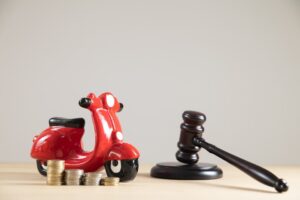The freedom is undeniable. Zipping through Chicago on an electric scooter or an e-bike, you bypass gridlock, enjoy the open air, and get where you are going with ease.
You are part of a transportation revolution. But that sense of freedom can be shattered in an instant by the negligent act of a motorist. A driver who is not paying attention, who turns without looking, or who simply fails to respect your right to the road can inflict devastating, life-altering injuries.
In the painful aftermath, you are not just a victim of a crash; you are a victim of a legal system that is still catching up to technology. How Illinois Law defines E-Bikes and Electric Scooter Regulations will become the foundation of your Accident Claim, and having a law firm that can wield that law is your most powerful weapon.
Powering up your legal position
When you are injured by a careless driver while riding an e-bike or scooter, the legal battle ahead is full of unique challenges. These are the core principles your attorney will use to build your case and demand justice.
- Illinois law has specific definitions for e-bikes and scooters that grant you the legal rights of a vehicle on the road. Your legal status is not a gray area; it is defined by statute.
- A driver’s fundamental duty to see what is there to be seen and operate their vehicle safely does not change just because you are on a scooter. Their negligence is the cause of your harm.
- Insurance companies will aggressively exploit any confusion about these new laws to deny your claim or blame you for the accident. An experienced lawyer’s job is to shut down this strategy with facts.
- The digital evidence from your ride—GPS data, speed, and trip duration—is invaluable and can be lost forever. A law firm must act immediately to send legal preservation demands to the rental company or manufacturer.
The Legal Landscape: From Confusion to Clarity
E-bikes and shared scooters are a relatively new presence on our streets, and this novelty is something insurance companies love to exploit.

Right after a crash, an adjuster may try to argue that you had no right to be on the road, that your scooter was an illegal "motor vehicle," or that you were a pedestrian who should have been on the sidewalk.
These are not good-faith arguments; they are deliberate attempts to create legal confusion where there is, in fact, legal clarity. Your attorney will cut through this manufactured confusion by grounding your case in the solid foundation of the Illinois Vehicle Code.
The state legislature has specifically addressed these new forms of transportation, and your lawyer will use these statutes as both a shield to protect you and a sword to attack the defendant’s arguments.
How Illinois Law Defines "Low-Speed Electric Bicycles"
The law, specifically 625 ILCS 5/1-140.10, creates three distinct classes of e-bikes. Your lawyer will immediately work to classify your specific bike because this classification establishes your legal rights and responsibilities.
- Class 1: This is a bicycle with a motor that provides assistance only when the rider is pedaling and ceases to provide assistance when the bicycle reaches 20 miles per hour.
- Class 2: This is a bicycle with a motor that can be used exclusively to propel the bicycle and is not capable of providing assistance when the bicycle reaches 20 miles per hour.
- Class 3: This is a bicycle with a motor that provides assistance only when the rider is pedaling and ceases to provide assistance when the bicycle reaches 28 miles per hour.
Proving your e-bike falls into one of these legal classifications, your attorney establishes that you were not operating an unlicensed motorcycle or moped, but a legal vehicle with the right to be on the road.
How Illinois Law Defines "Low-Speed Electric Scooters"
Similarly, the law defines what constitutes a legal electric scooter, such as those operated by companies like Divvy or Lime. It is defined as a device weighing less than 100 pounds, with handlebars and a floorboard, powered by an electric motor, and with a maximum speed of 20 miles per hour on a paved level surface.
Showing that the scooter you were riding meets this definition defeats any argument from the insurance company that you were operating an illegal or unregulated vehicle.
Your Rights on the Road: What Your Attorney Will Prove
These legal definitions are not just technicalities; they are the bedrock of your case. They allow your attorney to assert your rights and prove the driver’s duty.
The undeniable right to be present
Once your lawyer establishes that your e-bike or scooter meets the legal definition, they can assert your absolute right to have been on the road at the time of the crash.
This immediately dismantles the common defense that a driver might use, such as "I didn't expect to see a scooter there." The law says you have a right to be there, and therefore, the driver had a legal duty to expect you.
A driver's unchanged duty of care
A driver's responsibility to operate their vehicle safely does not diminish based on the size of the vehicles around them. Your attorney will argue that the driver who hit you owed you the same duty of care as they would owe a car, a truck, or a bus.
This includes:
- The duty to maintain a proper lookout for smaller vehicles.
- The duty to yield the right-of-way.
- The duty to provide a safe passing distance.
- The duty to check their blind spots before turning or changing lanes.
Your lawyer will build a personal injury case that proves the driver breached one or more of these fundamental duties, and that this breach was the direct cause of your injuries.
The Insurance Company’s Strategy: How They Will Fight Your Claim

The insurance company for the driver who hit you has one goal: to pay you as little as possible. With e-bike and scooter accidents, they have a playbook of specific tactics they use to devalue or deny your claim. An experienced lawyer will anticipate these moves and have a counter-strategy ready.
The "silent and fast" defense
Adjusters love to argue that e-bikes and scooters are a "surprise" on the road because they are quieter and can accelerate faster than a traditional bicycle. They will try to argue that you "darted out of nowhere," giving their driver no time to react.
Your attorney will dismantle this defense with facts. An accident reconstructionist can use physical evidence and crash data to calculate speeds and positions, proving that you were visible for enough time for a reasonably alert driver to have seen you and avoided the collision.
Witness testimony can further establish that you were operating your scooter or e-bike in a safe and predictable manner.
The "illegal vehicle" argument
As mentioned, they may try to misclassify your e-bike or scooter as an illegal motor vehicle to void their client’s coverage. Your lawyer will use the specific language of the Illinois Vehicle Code to definitively prove the legality of your vehicle and shut down this line of defense completely.
The "rule breaker" accusation
They will scrutinize your every action. Were you wearing a helmet? Did you have lights on at night? Were you riding on a sidewalk where it was prohibited? While safety precautions are always wise, your lawyer will argue that the driver's catastrophic negligence, like running a stop sign or making an illegal turn, is the true legal cause of your injuries.
A powerful legal argument can show that even if you had been following every minor rule, the driver’s reckless action would still have caused the devastating crash.
Your Attorney’s Investigation: How We Build the Case for You
While you are recovering from your injuries, your legal team will be taking immediate and aggressive action to build your case. This is not a list of tasks for you; this is what a law firm does on your behalf.
Securing the digital footprint
Unlike a traditional bicycle, shared scooters and many e-bikes create a digital record of your ride. This data can be invaluable. Your scooter accident lawyer will immediately send a legal preservation demand to the rental company (like Lime, Spin, or Divvy) or the manufacturer of your personal device.
This letter legally requires them to preserve all data related to your trip, which can include:
- Precise GPS data showing your route and location at the moment of impact.
- Speed data that can prove you were operating at a safe speed.
- The exact time your trip started and ended.
- Maintenance records for the specific scooter or e-bike you were riding.
This objective, digital evidence can be the key to refuting a driver’s false story.
The physical evidence and crash scene
Your attorney will also work to preserve the physical evidence. The damaged scooter or e-bike is a critical piece of evidence that can show the points of impact and the violence of the crash.
Your lawyer will ensure it is stored securely for expert analysis. At the same time, investigators will be sent to the crash scene to document the area, search for surveillance cameras on nearby businesses, and identify any witnesses the police may have missed.
AI Cannot Argue Nuance in Illinois Law
An AI chatbot might be able to pull up the text of the Illinois statute defining an e-bike. But it cannot craft a legal argument explaining why that definition applies to your specific vehicle.
It cannot take the deposition of the driver who hit you and expose their lies. It cannot stand before a judge and argue that the insurance company is misinterpreting the law in bad faith.
For a case that hinges on the specific application of new and complex laws, you need the strategic mind and courtroom experience of a real trial lawyer.
Contact a Chicago Accident Law Firm Today
You were injured because a driver failed to share the road safely. Now you are facing a difficult recovery and a fight against an insurance company that will use every trick it can to avoid paying your claim. You do not have to fight this battle on your own.

You need a law firm that understands the specific laws that protect you and has a proven record of holding negligent drivers accountable.
Let us fight for you. The attorneys at Abels & Annes, P.C. have the experience and the resources to build the powerful, evidence-based case you need. Call us now at (312) 924-7575 for your free, no-obligation consultation. We are available 24/7, and you will pay no fee unless you win.